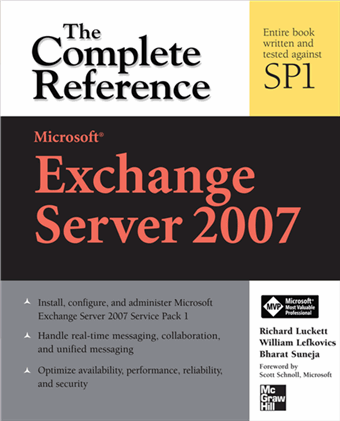IT folks in many organizations still on Exchange 2000 are upset about the fact that Microsoft isn't providing the DST 2007 CDO patch for Exchange 2000 for free, unlike the ones for Exchange 2003. (Exchange Server 2007 does not require it).
If you're still on Exchange 2000, and upset about the price-tag of this patch, and ongoing support costs, consider the following:
- Exchange 2000 is now in extended support, after five years of being in mainstream support:
Microsoft's support policy for Exchange 2000
- Exchange has undergone two major product releases/updates (Exchange Server 2003 & 2007) since then.
- Moreover, the DST issue is not a product vulnerability or security issue. It was the government's doing, thanks to the Energy Policy Act of 2005, and the issue was non-existent when Exchange 2000 (and also Exchange Server 2003) was released.
- In many environments, the cost of upgrading to a currently-supported Exchange version (Exchange Server 2003 or Exchange 2007), even after factoring in the cost of new hardware, may be lower than the ongoing support costs and costs of downtime. (If you run a perfect Exchange operation where outages *never* happen, this doesn't apply to you.. :)
- In smaller, single-server environments with low number of users (let's say SBS-type environments) - the cost of this patch alone could possibly buy you a new server and Exchange license.
If you're still on Exchange 2000, and upset about the price-tag of this patch, and ongoing support costs, consider the following:
- Exchange 2000 is now in extended support, after five years of being in mainstream support:
Microsoft's support policy for Exchange 2000
- Exchange has undergone two major product releases/updates (Exchange Server 2003 & 2007) since then.
- Moreover, the DST issue is not a product vulnerability or security issue. It was the government's doing, thanks to the Energy Policy Act of 2005, and the issue was non-existent when Exchange 2000 (and also Exchange Server 2003) was released.
- In many environments, the cost of upgrading to a currently-supported Exchange version (Exchange Server 2003 or Exchange 2007), even after factoring in the cost of new hardware, may be lower than the ongoing support costs and costs of downtime. (If you run a perfect Exchange operation where outages *never* happen, this doesn't apply to you.. :)
- In smaller, single-server environments with low number of users (let's say SBS-type environments) - the cost of this patch alone could possibly buy you a new server and Exchange license.
Labels: Administration, DST 2007, Microsoft, Newsbytes

 Exchangepedia Blog is read by visitors from all 50 US States and 150 countries world-wide
Exchangepedia Blog is read by visitors from all 50 US States and 150 countries world-wide



9 Comments:
Small companies who are happy with their current setup have no ability to accomodate any of these options. And the piece of mail that MS sent out about only having to pay $4000 for any amount of OS's not under support is a real help.
Highway robbery and a prime example of vendors holding clients hostage. It's this type of ridiculous support policy that quickly breeds ill will. I know if I was in this situation the first thought in my mind would be to see just how painful it would be to pursue alternative products.
Believe it or not, Exchange 2003 was a minor update to Exchange 2000.
Mike, I've mostly maintained that Exchange 2003 "wasn't a major upgrade" *from Exchange 2000*.
In those instances, the term "major" was in comparison to moving from Exchange Server 5.5 to Exchange 2000, and Exchange 2003/2000 to Exchange Server 2007 - both of which can be seen as "major" upgrades. The number of things that changed with those upgrades were huge!
Also, going by the version numbers:
Exchange 2000 = 6.0
Exchange 2003 = 6.5 :)
However, purely going by Microsoft product releases, it wouldn't be incorrect to say Exchange has seen 2 of those since Exchange 2000.
- Bharat
Anonymous poster #2:
The way I look at it, it's like buying a car from GM or Ford when seat belts were not mandated by law, and 7 years later the government made seat belts mandatory. Would you expect GM or Ford to retrofit those 7-year-old vehicles with seat-belts for free? (A vague analogy, and I don't quite know what happened when seat belts were in fact made mandatory by law - but hopefully it gets across the message... ).
Similarly, I wouldn't expect a software vendor to provide free fixes for software that's clearly not in active support according to the vendor's previously and publicly stated policies, and for issues that are neither security vulnerabilities nor something that the vendor could be held accountable for - it was the Energy Policy Act of *2005*.
- Bharat
Microsoft comes out of this looking very greedy. To charge everyone $4000 is an obvious attempt to force people to upgrade and spend thousands and thousands more than they need to.
Better yet, download the patch for free, since it's now posted everywhere on the web, and use your MSDN free support call to microsoft support to make them install it and make sure it works. Even pay them the 250 they get for a support call, just to make them do the work for you. It's worth it. $4K is beyond greedy simply to help folks who use their product, 250.00 I can swallow down.
The $4K price tag is an arbitrary figure and no-way represents any cost recovery for Microsoft. Shrink the price tag and I'm on board. Nail me to the wall and I go looking for open source, multi-domain capable mail servers which I am in the process of doing. 98% of my backoffice is Microsoft and now that percentage will drop because they want to squeeze me when I needed them most......doesn't sound like good partnership to me. Besides, the $4K is nothing to sneeze at for small to mid-size companies who are trying to drive down IT costs.
The 4000 Price tag is only if you have a Premier Support Contract with MS. That can run you 5-6 figures in cost. Almost every article does not mention this!
Post a Comment
Links to this post:
Create a Link
<< Home